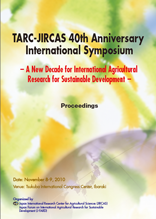Alternative Approaches to Solve International Issues ? a case for strengthiing network of national institutions

To help strengthen international agricultural research activities conducted by Japanese researchers
and institutions, the MAFF started from FY2010 a new project called ‘International Research Network
Program on Global Issues’.
This project has two centerpieces below.
A Funding for certain research activities by consortia of research institutions, which aims to solve
global issues
B Facilitating the formulation of a international research network, through organizing symposium,
conducting strategic research and builidng infrastracture for information sharing.
In this presentation, some of the ideas that has driven this project will be explained, with specific
focus on two key concepts , ie.‘ International Agricultural Research’ and ‘ Networking’.
The term ‘International Agricultural Research’ is commonly used, but the images that the word
evokes are somewhat varied and the precise meaning is not so well defined. We propose to give this
word a rough, working definition, i.e. “research activities in the field of agriculture, forestry and
fisheries, which require some forms of coordination and cooperation with overseas partners, including
those in the developing countries”. Many Japanese researchers and institutes, in our view, have been
actively engaged in such research activities, with the aim of helping to solve the global issues. There
are those research themes which does not require any international coordination, but on the other hand,
if they need foreign material or environment, usually there is no way but to seek help from overseas
partners.
We are of the view that, by strengthening International Agricultural Research activities of Japanese
researchers and institutes, we can help solve the global food issues and make a positive contribution to
the enhancement of our national food security. Based on this belief, we further developed our ideas on
what the government can do to help strengthening International Agricultural Research.
In business management context, a “Network” is defined as a collaborative relationship among
independent companies, and such relationship is normally formed with the aims of having a stronger
competitive power over the others. An effectively formed network can, for example, complement each
other’s strength, and can produce what each company cannot produce individually. Specific merits of
networking may include: complementarities, optimization of resource allocation, effective provision
of services for the external users, etc.
Since most of the advancement of agricultural science and technology is offered as public goods,
many of the researchers and the developers in these fields are working for honors, not for private
economic gains. Therefore, in theory, it actually makes sense to work together, rather than to compete,to produce better results and deliver better products to the end-users. That will lead to elevating the
international status of Japanese agricultural research community, and more people will stand to gain as
a result.
Turning our eyes to the current stuation in the country, what we find is that the smaller individual
researchers and institutes, with the exception JIRCAS, engaged in ‘International Research’ on its own
with little cooperation, coordiantion on their approches. The public research funds also tend to favor
domestic research, and often have many restrictions in its use overseas. Moreover, there are many
Japanese researchers who have useful materials and methods that can be of use overseas but simply do
not know how they can get to know such overseas contacts, or worse, even do not realize such
potentials. We believe there are many cases of hidden treasures and lost opportunities.
‘International Agricultural Research’ should be promoted by country-wide Japanese agricultural
science commnuty. We do not agree to the view that if JIRCAS is doing the job, there is no need for
the others to follow suit. We appreciate the significant achievements which JIRCAS has made over its
40 year history, but JIRCAS does not have legal authory over the others and simply can not do its
work alone. We should promote and foster a sense of community among the Japanese scientists who
are engaged, or are willing to be engaged, in international research, and raise an awareness that we all
should work together.
If we can successfully form a ‘network’ of Japanese agricultual international researchers in the
country, we believe that we can produce something better. If we bring out togther the ideas and
materials that we can work on, that in itself may stiumulate each other’s imagination, and help us to
create something innovative.
If we can bring together those Japanese researchers who have a common concern for global
agricultural issues, and willing to work with international community on those issues, and form an
effective “network”, such network will help individual researchers as well, by making the best of their
strength and covering the weakness of each other. We will be able to demonstrate the power that each
individual cannot. There are many ways to share information in the network. For example, it may well
be possible to hold symposiums and workshops for that purpose. In this day and age, we can also
make use of various IT and set up a home page. It is worthwhile to let the others know what you are
working on. It may also be worthwhile to share specific facts and research results that the others may
find interesting. It would be wonderful if such information exchanges will eventually lead to
formulation of collaborative projects.
All the researchers of Japan, unite, and let us show to the world what a difference we can make!
| Date of issued | |
|---|---|
| Creator | Ryotaro Suzuki |
| Subject |
International research network |
| Publisher | Japan International Research Center for Agricultural Sciences |
| Available Online | |
| Issue | 2010 |
| spage | 81 |
| epage | 87 |
| Rights | Japan International Research Center for Agricultural Sciences |
| Language | eng |
